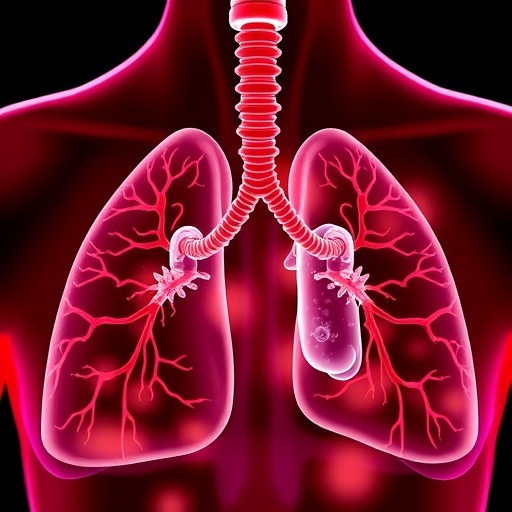FOR IMMEDIATE RELEASE, November 4, 2025
New Insights into Mucus Plugs Unveil Shared Molecular Mechanisms with Chronic Bronchitis in COPD
Chronic obstructive pulmonary disease (COPD) ranks as a devastating illness globally, burdening nearly 29 million Americans alone and holding the position as the fourth most lethal cause of death. Central to the debilitating airflow obstruction characteristic of COPD are pathological mucus accumulations within the airways. These mucus plugs, along with chronic bronchitis—a condition defined by persistent cough and sputum production—represent manifestations of airway mucus dysfunction that have garnered increasing scientific interest. Intriguingly, although both phenomena are linked to impaired mucus clearance and airway obstruction, they frequently present independently, suggesting both overlapping and unique underpinning pathophysiologies.
The scientific community presently faces a significant therapeutic gap in COPD management, particularly concerning modalities that can dismantle or prevent mucus plugging and chronic bronchitis at their biological roots. A landmark experimental study led by researchers at Boston University’s Chobanian & Avedisian School of Medicine has shed crucial light on this intersection. By analyzing gene expression changes associated with mucus plugging, this pioneering research delineates molecular signatures that are strikingly conserved between mucus plug-laden lung regions and chronic bronchitis, unmasking potentially shared biological drivers for these conditions.
Mucus plugs contribute substantially to airflow limitation, exacerbations, and compromised patient outcomes, including elevated mortality risks and deteriorated quality of life. Professor Marc Lenburg, PhD, emphasizes that the inability to effectively manage mucus plugs stems largely from an incomplete grasp of the airway biological shifts they engender. This study utilizes state-of-the-art RNA sequencing technologies to quantify gene activity within airway epithelial cells procured from individuals exhibiting varying degrees of mucus plugging, thereby enabling a comprehensive, high-resolution molecular portrait.
The investigation leveraged the Detection of Early Lung Cancer Among Military Personnel (DECAMP) 2 cohort, a group predominantly composed of older U.S. military veterans with extensive smoking histories, many already diagnosed with COPD. High-resolution computed tomography (CT) scans provided precise quantification and localization of mucus plugs in the participants’ lungs. Subsequent bronchoscopic sampling of airway cells allowed researchers to extract and analyze cellular RNA, enabling a direct correlation between mucus plug presence and differential gene expression patterns.
Upon identification of a “mucus plugging gene signature,” researchers performed comparative analyses against gene expression profiles characteristic of chronic bronchitis and other respiratory pathologies. The findings revealed a remarkable convergence, suggesting that mucus plugs may induce, or arise from, similar transcriptional rewiring, encompassing pathways implicated in inflammation, mucin production, immune response, and epithelial remodeling. This overlapping molecular landscape not only underscores the biological kinship between these mucus-related conditions but also illuminates novel molecular targets amenable to therapeutic intervention.
Coauthor Dr. Ehab Billatos, MD, remarks on the translational potential of these insights, highlighting how delineating the molecular choreography underlying mucus plugging and chronic bronchitis could spearhead earlier diagnosis through biomarker development and foster the creation of targeted treatments aimed at restoring mucus homeostasis. Ultimately, such advances hold promise to attenuate respiratory symptoms, curtail disease progression, and significantly enhance the quality of life for millions afflicted by COPD.
Beyond identifying shared gene expression patterns, the study provides a critical framework for understanding the mechanistic cascades that precipitate mucus hypersecretion and impaction within the airways. This involves dysregulation of mucin genes, altered cellular signaling within the airway epithelium, and recruitment of inflammatory cells that exacerbate airway obstruction and tissue damage. By mapping these molecular aberrations, the research team has laid groundwork essential for drug discovery programs targeting these pathogenic pathways.
Importantly, this investigation represents one of the first to systematically interrogate mucus plugging at a genomic scale, integrating clinical imaging with molecular biology. The multi-modal approach enhances the robustness and clinical relevance of the findings, moving beyond correlative descriptions toward a mechanistic understanding capable of guiding precision medicine strategies. It is anticipated that future studies will expand upon these conclusions by incorporating longitudinal assessments of mucus plug dynamics and therapeutic responses.
Funding support for this groundbreaking study was provided by the Department of Defense, the National Institutes of Health, Johnson & Johnson, and the Novartis Institute for Biomedical Research, highlighting the interdisciplinary collaboration essential to tackling complex respiratory diseases. The full findings are documented in an article published online October 21, 2025, in the American Journal of Respiratory and Critical Care Medicine, marking a significant contribution to respiratory medicine literature.
This research not only spearheads a paradigm shift in how mucus plugs and chronic bronchitis are conceptualized but also galvanizes renewed efforts toward translational applications that may ultimately alleviate the substantial morbidity associated with COPD. As the scientific community continues to unravel the molecular intricacies of airway mucus pathology, these results represent a beacon of hope, promising innovative interventions that could redefine standards of care for chronic lung disease patients globally.
Contact:
Gina DiGravio
Boston University School of Medicine
ginad@bu.edu
Office: 617-358-7838
Cell: 617-224-8962
Subject of Research: Cells
Article Title: Mucus Plugs-associated Gene Expression Identifies Pathophysiology Shared with Chronic Bronchitis
News Publication Date: November 4, 2025
Web References: 10.1164/rccm.202501-0262OC
References: Published in American Journal of Respiratory and Critical Care Medicine, October 21, 2025
Keywords: Health and medicine




